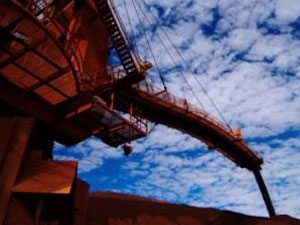
[miningmx.com] – ACCESS to the iron ore resources in Sishen, a mine in the Northern Province, was one of the more hotly contested corporate battles to travel through South Africa’s courts. In fact, an appeal by Imperial Crown Trading (ICT) is still to be picked over by the Constitutional Court.
The contest kicked off more than three years ago and all may be thrown asunder if the Constitutional Court upholds ICT’s appeal. For the time being, however, an iron ore pricing agreement signed on November 5 between Kumba Iron Ore, the 100% owner of Sishen and ArcelorMittal South Africa seems to have brought the messy, convoluted, legally labyrinthal saga to an abrupt close.
If you recall, ICT thought AMSA’s failure to apply for a new order mining right at Sishen, in which it was a part holder from when AMSA and Kumba were divisions of Iscor, compelled ICT to think it could supplant AMSA. Kumba’s view was that AMSA’s failure to apply for a new order mining right released it from a preferential cost plus 3% marketing agreement with AMSA.
As it turned out, ICT’s claim was rejected by the High Court and Supreme Court, but Kumba and AMSA continued to bicker about the price of iron ore. They couldn’t agree. Arbitration loomed. An interim pricing agreement was signed. Then, to some surprise, they re-opened negotiations resulting in last week’s agreement.
It’s quite a complicated story, but to the casual observer, the question is: who won, AMSA or Kumba? The best answer is to apply time logic. In the short-term, AMSA won; in the long-term, it could be Kumba. Here’s why.
From AMSA’s perspective, it is paying about $10 less per tonne of iron ore than in the interim pricing agreement which set the price at $65/t (which is still below current market prices for the stuff, around $133/t).
It has also shifted the cost and risk of managing Thabazimbi, a near depleted iron ore mine in the Limpopo province back to Kumba which it had operated because it had rights to 100% of its production.
Add to that the removal of price uncertainty in AMSA’s life and it’s clear shareholders are getting a big lift, a development reflected in AMSA’s share price up about 33.5% since September.
It also helps AMSA shareholders that third quarter figures delivered the first consensus earnings upgrade in more than four years. Given AMSA’s balance sheet is recapitalised, and its cost-cutting of the last few years, means the stock is geared to US and European economic recovery. In short, life looks rosier for one of the most under-owned blue chips on the JSE.
For Kumba, taking back ownership of Thabazimbi is management’s bet that new technology will enable it to breathe new life into the mine.
Coupled with the adjacent Phoenix project – a venture over which AMSA was also threatening legal action until the price agreement last week – Kumba is hoping to have a brand new asset and the freedom to sell iron ore from the properties to whosoever its pleases.
That’s because the pricing agreement with AMSA is constructed in such a way that Kumba can sell 6.25 million tonnes a year to AMSA from a combination of assets, not just Sishen which was a feature of the previous supply deal. As one analyst describes it, for every tonne sold to AMSA from Thabazimbi, another tonne can make its way to the export markets at export parity prices.
And at $55/t, the average price analysts think Kumba will now supply AMSA iron ore, it’s still way above the cost plus 3% equation with which it had been previously saddled.
Short-term, though, Kumba has problems. Is it me or has Anglo American, the owner of Kumba, turned a new leaf on frankness? Days after Anglo CEO, Mark Cutifani, said Kumba had to pull its socks up, its CEO, Norman Mbazima declared to Business Day that Sishen was keeping him awake at night. It was “a nightmare,’ he said.
The fact is that Kumba has volume and cost problems at Sishen, a temporary but troubling problem for Anglo American which once viewed its iron ore producer as the jewell in its crown.
For Mbazima, he has to restore Kumba’s shine, and hope that the Constitutional Court doesn’t spring a surprise when it hears ICT’s case.










